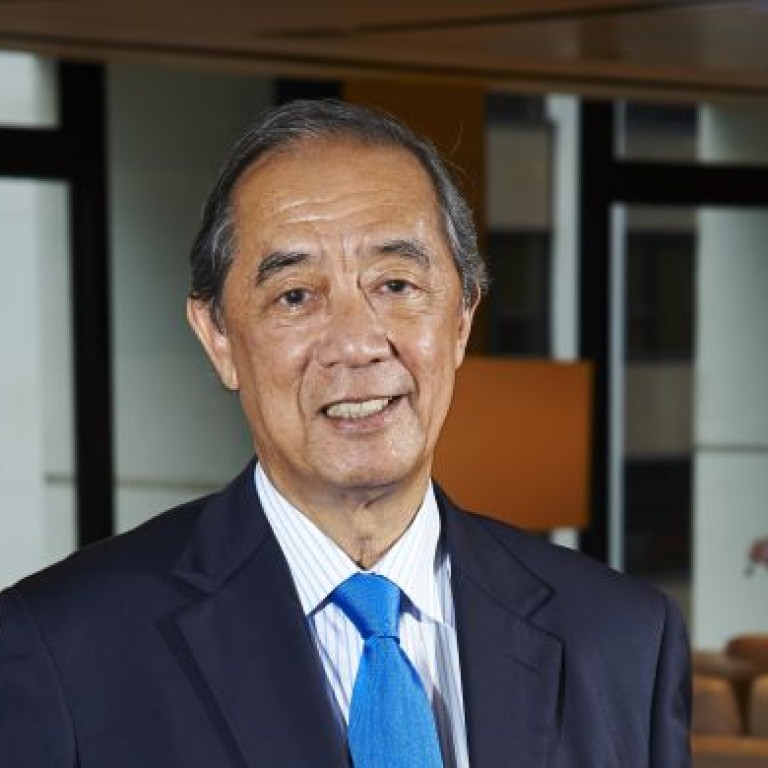
Ronald Arculli
One of Hong Kong’s most influential figures, Ronald Arculli has been chairman of Hong Kong Exchanges and Clearing, the top-ranking ExCo member, and vice-chairman of the Liberal Party. A senior partner at law firm King and Wood Mallesons, he is also on the board of the West Kowloon Cultural District and chairs the HK Arts Festival. He tells Andrea Lo about growing up during World War II and his hopes for Hong Kong after 2047.
I was born in Hong Kong in 1939. I grew up during the war.
My father’s family came from India in about 1840 and settled in Hong Kong. My mother’s side came from China in 1880.
My parents separated when I was young. My mother brought us up as a single parent.
We moved to Happy Valley. I remember in the early mornings, you heard the horses walking down from the stables on Shan Kwong Road and into the racecourse.
When the air raid sirens went off, the Japanese expats would drop their shopping and run for shelter. The Hong Kong people would go and pick it up. It was free food.
I was in secondary school here, then I went to school in England. I qualified as a barrister in 1961.
My mother and her twin sister were both teachers. They used to tease me: “You love to talk so much, you might as well be a lawyer.” I’m sure some of that sank in.
I picked up two things as a law student: one is horse-racing, and the other one is football.
When I got back in 1965, I went into a set of chambers with three barristers. One of them, Oswald Cheung, was quite keen on visual arts. He introduced me to local artists.
Even at that stage, I had to save money to buy art.
I left the law for about 18 months in the mid-1970s. I worked for a local stock brokerage operation. I went back to the law, but jumped ship to go from a barrister to solicitor.
Being a solicitor gives me the flexibility to do not strictly law-related activities, such as sit on the boards of companies, become a member of Legco, as well as community and public service.
A community with rich arts and culture has a slight edge over those that don’t pay much attention to it.
Arts and culture always need finance, because it’s not a particularly profitable activity.
Being a lawyer, I read quite quickly. Time allocation is something that you learn to manage. But obviously, there are things that take priority in my life.
I rely on a lot on people for advice and help. You can only do so much as an individual.
I can’t recall now whether I’ve committed a major boo-boo. But I think luck had something to do with that as well.
As a young barrister, I was told by a number of senior lawyers, “You owe it to the next client, to be able to switch off when you finish a case.”
I sleep very well, I sleep everywhere, and I don’t need a lot of sleep.
I guess at one stage or another, I need to face the inevitable. If you don’t have the energy level, you need to do less.
The biggest change in Hong Kong is what I would call the lack of change. We seem to be able to absorb it and take it in our stride.
It’s sad that [a backlash against mainlanders] is happening. The aggro that some parts of the community feel today is probably caused by misunderstanding, cultural differences, or simply dissimilarities in attitude.
It’s human frailty, but I hope that the adjustment will be made soon, and we’ll become more tolerant of each other.
I don’t think I’m influential. There are younger people who are far more capable of running for Chief Executive.
What Hong Kong will be after 2047 is a very tough question. We will probably have the answer to that before [the date] comes.
Right now we should focus more on resolving issues that confront us today, and try the best we can to find consensus.
I always had confidence and faith in Hong Kong, in the fact that things will be resolved, and that things will work out.
I know that there are people who have different points of view in terms of democratic development, but these are issues that we knew would come up back when the Basic Law was created. Going forward, we just have to cross the bridges as we find them.
I’m sure there are things I wish I could have done differently. I’m glad that I can’t remember—otherwise it might keep me awake at night.
Sense of humor is very important. Even when you’re in a serious meeting, sometimes you get to a point where you can feel the pressure coming down on everybody. A humorous remark here and there might liven it up and release the tension.
My favorite thing about Hong Kong is being here, and the least favorite is when I’m away.
Our family is an open one, although occasionally I’m accused of being a dictator. I would like to think that I’m not.
Out of five children, none of them have taken up the law. They say, “Gosh, the way we see you work—you don’t have much of a life.”
I think I have a very good life.

